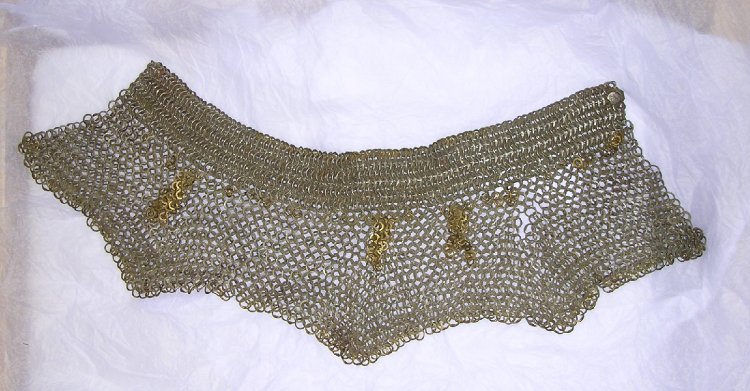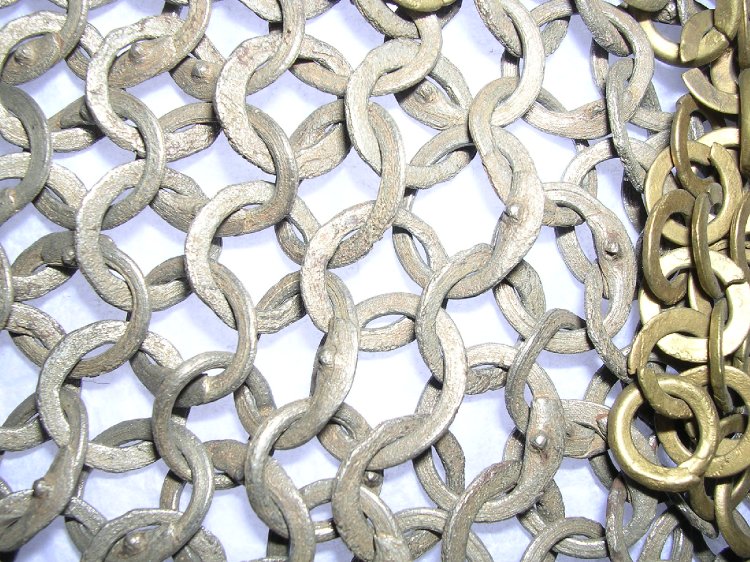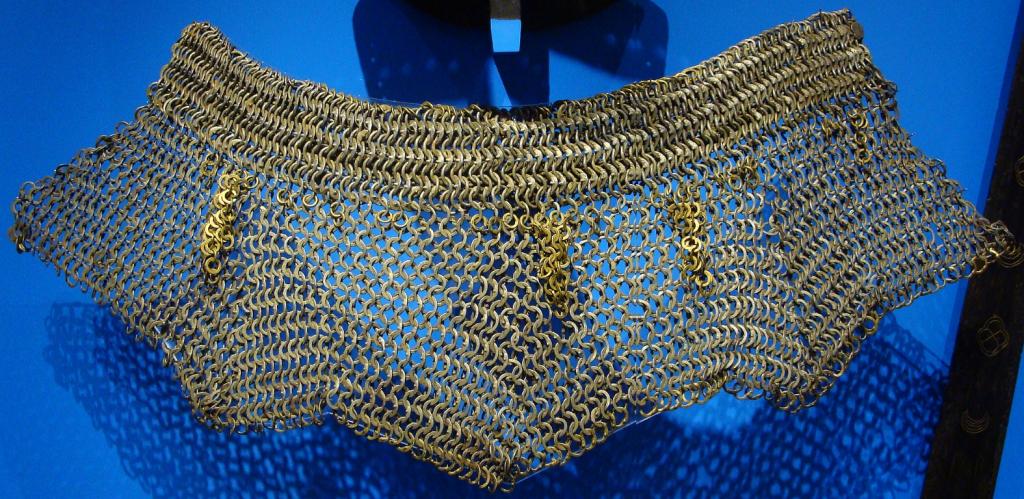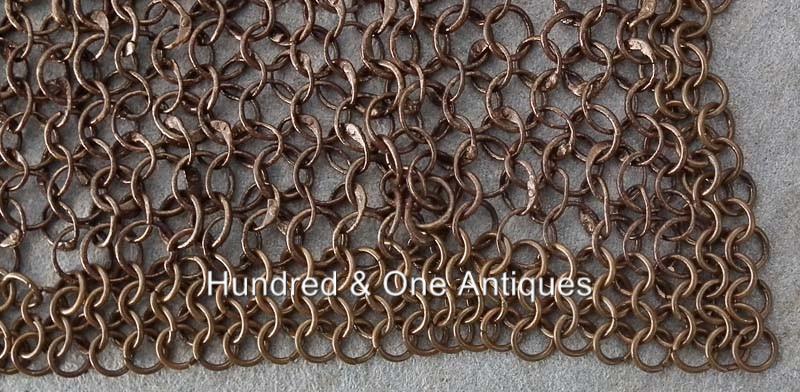Hi guys, I've just joined this forum (although have been lurking/reading stuff on here for ages!)
The reason I'm posting is because while reading Alex Hildred's Weapons Of Warre (The Armaments of the Mary Rose) there''s a chapter regarding armour and mail found on the ship when it was recovered.
It turns out that amongst the mail were numerous items (I think about 19) of mail made from a mixture of butted and riveted mail. I've never heard of this before, but they're documented, photographed and analysed in the book. The ship sank in 1545, and as far as I've been aware butted mail just wasn't used during that period in Europe. It's especially odd to find butted mail in the same piece as riveted mail. The majority of the items seem to be butted, with edges and small areas being riveted.
My question - is this completely unknown outside the Mary Rose, or are there other existing/documented examples of butted mail from around the 15th Century (perhaps earlier/later) and more interestingly are there other examples of mail clothing/armour with a combination of butted and riveted mail all in the same piece?
Thanks!
I thought that the few pieces of mail found on the Mary Rose were decorative links made of leaded brass.
Edit: According the the Mary Rose Trust database there are 31 pieces of mail but some of these aren't mail at all but clothing fasteners. The rest could be decorative copper alloy links of butted mail. Except for one - #82A6000 - which is listed as made of both copper alloy and iron butted links. Assuming it actually is armour, the fragment is too small to learn anything useful from it, but there is no reason to think that the few butted iron links were not a repair.
Edit: According the the Mary Rose Trust database there are 31 pieces of mail but some of these aren't mail at all but clothing fasteners. The rest could be decorative copper alloy links of butted mail. Except for one - #82A6000 - which is listed as made of both copper alloy and iron butted links. Assuming it actually is armour, the fragment is too small to learn anything useful from it, but there is no reason to think that the few butted iron links were not a repair.
https://s-media-cache-ec0.pinimg.com/originals/8c/26/e2/8c26e26409f4f3df9e2eaba02a61173b.jpg
It's hard to define most of these as mail rather than chains or closure rings.
The brass "ermine-tails" applied to the British Museum standard with the 6:1 collar are also "butted".
 Attachment: 87.67 KB
Attachment: 87.67 KB

 Attachment: 154.18 KB
Attachment: 154.18 KB

It's hard to define most of these as mail rather than chains or closure rings.
The brass "ermine-tails" applied to the British Museum standard with the 6:1 collar are also "butted".


Ah ok, so it's safe to assume then that the butted mail was essentially a quick method of adding decoration, and had no strength/defensive attributes? Makes sense!
Cheers for the quick replies!
Cheers for the quick replies!
| Mart Shearer wrote: |
| https://s-media-cache-ec0.pinimg.com/originals/8c/26/e2/8c26e26409f4f3df9e2eaba02a61173b.jpg
It's hard to define most of these as mail rather than chains or closure rings. The brass "ermine-tails" applied to the British Museum standard with the 6:1 collar are also "butted". |
Interesting. Do you have any more information regarding this standard? I reproduced a standard - admittedly with butted links - with the same 6:1 pattern on the neck as it seemed to sit better, and provided a better platform for my armet to rest over and turn.
Anthony,
The British Museum page has a bit more information like dimensions and weight.
http://www.britishmuseum.org/research/collect...amp;page=1
Here's the close-up of the collar:
[ Linked Image ]
Thom Richardson's thesis indicates these were likely categorized as "pisanes" in 14th century inventories.
http://etheses.whiterose.ac.uk/3919/1/Thom_Ri..._final.pdf
It is possible that the collar is a later addition done during the working life of the piece, as Erik Schmid believes the collar to be 16th century, but the demi-riveted construction in an English context seems to indicate <c.1340. The later date might also explain the addition of the butted dags which would be visibly worn.
http://forums.armourarchive.org/phpBB3/viewto...mp;t=29220
The British Museum page has a bit more information like dimensions and weight.
http://www.britishmuseum.org/research/collect...amp;page=1
Here's the close-up of the collar:
[ Linked Image ]
Thom Richardson's thesis indicates these were likely categorized as "pisanes" in 14th century inventories.
http://etheses.whiterose.ac.uk/3919/1/Thom_Ri..._final.pdf
| Quote: |
| Only one form of mail collar is found Fleet’s account, the pisane. A surviving
example of this type of defence datable to the fourteenth century from London is the mail collar in the British Museum, from the Roach Smith collection which was found on London Wall, Moorgate, and could conceivably therefore be one of the collars of mail originally from the Tower. This exhibits numerous interesting features, having alternate rows of riveted and solid links, a border of riveted links of latten, pendant dags of butted links of latten (which are mostly lost due to the fragility of this construction), and a most unusual collar section formed of riveted and solid links connected to three links above and below, making a remarkably dense form of mail. The decorative dags of latten links clearly show that this collar was intended to be worn on top of any other garments, whereas in artistic representations of the period generally only the section worn round the neck is visible, the rest hidden under the coat of plate or the surcoat. In modern times the term pisane has come to represent a mail cape rather than a collar, of the type sometimes called a ‘Bishop’s mantle’ in the terminology used by collectors of armour. |
It is possible that the collar is a later addition done during the working life of the piece, as Erik Schmid believes the collar to be 16th century, but the demi-riveted construction in an English context seems to indicate <c.1340. The later date might also explain the addition of the butted dags which would be visibly worn.
http://forums.armourarchive.org/phpBB3/viewto...mp;t=29220
| Erik D. Schmid wrote: |
| As for the standard in the British Museum it does indeed have a collar woven in the 6-1 pattern. Judging by the style of links used in the collar I would place it in the sixteenth century. |
| Thom Richardson wrote: |
| The evidence in the Tower accounts shows that the traditional date of 1400
before which European mail was made of half-riveted, half solid links, needs to be revised to about 1340. |
| Anthony Farrow wrote: |
|
Interesting. Do you have any more information regarding this standard? I reproduced a standard - admittedly with butted links - with the same 6:1 pattern on the neck as it seemed to sit better, and provided a better platform for my armet to rest over and turn. |
Museum number:1856,0701.2244
Description:Mail collar or standard, of iron and copper alloy, covering the neck and extending onto the shoulders. The section for the neck is formed of riveted mail links, each connected to three links in the rows above and below (1:6). The lower section is of alternate rows of riveted and welded links, and is shaped to fall in points over the shoulders and at the centre rear. The lower edge and centre portion of the upper edge are formed of riveted copper alloy links. Around the base of the neck section is an intermittent row of butted copper alloy links, from which three remaining decorative mail triangles, also formed of butted copper alloy links, and part of a fourth, fall. At the right end of the colllar is the base of an iron clasp, with a large washer on the inside. A few links are missing, leaving a hole at the centre right and smaller holes at the centre and left.
Date:1350 (circa)
Made in: England (?)(Europe,United Kingdom,England)
Materials:iron, copper alloy
Dimensions: Width: 670 millimetresDepth: 10 millimetresHeight: 260 millimetresWeight: 1010 grammes
Curator's comments:The 1:6 ratio of mail on the collar is extremely rare. Mail collars of this sort, called standards or pizanes, are recorded in large numbers in the inventories of the Tower of London arsenal in the late 14th century.
http://www.britishmuseum.org/research/collect...p;partId=1

[ Linked Image ]
| Will S wrote: |
|
It turns out that amongst the mail were numerous items (I think about 19) of mail made from a mixture of butted and riveted mail. I've never heard of this before, but they're documented, photographed and analysed in the book. |
Can you post one of the photographs, I have heard of solid links being described as "butted" when the ends are butted together and welded, I would be nice to find out if the links were actually butted as it could just be a matter of the links in question not being described properly.
I apologise for the quality - these are photos I've taken of the photos in the book!
I don't know enough about maille to have the first clue what sort of item of clothing this was, but it does seem that the majority of the rings are butted, although riveted links can clearly be seen at the top of the first photo.
Hope this helps?


I don't know enough about maille to have the first clue what sort of item of clothing this was, but it does seem that the majority of the rings are butted, although riveted links can clearly be seen at the top of the first photo.
Hope this helps?


And the link, again, for those who missed it the first time.
https://s-media-cache-ec0.pinimg.com/originals/8c/26/e2/8c26e26409f4f3df9e2eaba02a61173b.jpg
For those who have difficulty clicking a link,
[ Linked Image ]]
The butted rings appear to be the latten edging on riveted iron rings.
https://s-media-cache-ec0.pinimg.com/originals/8c/26/e2/8c26e26409f4f3df9e2eaba02a61173b.jpg
For those who have difficulty clicking a link,
[ Linked Image ]]
The butted rings appear to be the latten edging on riveted iron rings.
| Will S wrote: |
| I apologise for the quality - these are photos I've taken of the photos in the book!
I don't know enough about maille to have the first clue what sort of item of clothing this was, but it does seem that the majority of the rings are butted, although riveted links can clearly be seen at the top of the first photo. Hope this helps? 
 |
Thanks Will. your right, the photograph clearly shows riveted links and butted links, its unfortunate that this is only a small patch of mail and not a whole armor. The only time I see mail in this arrangement is when the butted links have been used as a repair to a riveted mail with holes. Here is an image of some Indian riveted and solid link mail with butted links added at a later date to repair holes and to fill in for missing links. I can not think of any other reason to mix riveted and butted links together.

| Will S wrote: |
| I apologise for the quality - these are photos I've taken of the photos in the book! |
There is only a single mention of iron mail in the Mary Rose database. Item number 82A6000 is listed as a combination of copper alloy and iron links. As far as I know, the patch of mail in the bottom right corner of Mart's photo is that piece. The black and white photo is not of that piece, it is another, much larger, patch of mail. I might have missed it but I looked through every single one of the 14000+ entries in the Mary Rose database and found no mention of it. Perhaps someone else can find it for me.
http://www.maryrose.org/discover-our-collection/archive/
Ah well I can help with that.
The item number for the larger piece of mixed links is MR 83A0153.
If I may, I'll quote from the book in regards the mail found:
"Nineteen fragments of mail were excavated from the Mary Rose. Additional mail links were recovered during the sieving of spoil heaps in 2003. Some of the recoveries comprise several pieces. Nine samples were analysed by E.E.H. Pitt for composition using XRFS. All proved to be leaded brass.
No complete garments are present. Many fragments are only one link deep, linked laterally and resembling a chain. It is likely that these fragments are decorative edging of larger items of mail made of iron which have corroded away. Several fragile examples are still within concretion and radiography suggests the presence of iron links.
There are three examples with mixed link types, all more than one link deep. One is a mixed butted and riveted piece with circular cross section (81A0918) and the other two are mixes of butted, overlapped semicircular and overlapped circular cross section. The largest fragment recovered is (83A0153). It was foumd in concretion during the cleaning of the ship. It was recovered from the area of the Carpenters' cabin amd was associated with iron concretion."
The item number for the larger piece of mixed links is MR 83A0153.
If I may, I'll quote from the book in regards the mail found:
"Nineteen fragments of mail were excavated from the Mary Rose. Additional mail links were recovered during the sieving of spoil heaps in 2003. Some of the recoveries comprise several pieces. Nine samples were analysed by E.E.H. Pitt for composition using XRFS. All proved to be leaded brass.
No complete garments are present. Many fragments are only one link deep, linked laterally and resembling a chain. It is likely that these fragments are decorative edging of larger items of mail made of iron which have corroded away. Several fragile examples are still within concretion and radiography suggests the presence of iron links.
There are three examples with mixed link types, all more than one link deep. One is a mixed butted and riveted piece with circular cross section (81A0918) and the other two are mixes of butted, overlapped semicircular and overlapped circular cross section. The largest fragment recovered is (83A0153). It was foumd in concretion during the cleaning of the ship. It was recovered from the area of the Carpenters' cabin amd was associated with iron concretion."
Just realised I have a table of details as well which isn't on the MR website if anybody's interested?
I'll post the details for the large fragment of mixed links but if anybody finds a record of MR mail that interests them I'll happily do the same for those.
83A0153
Sector - M9
Form - "frag. of 92 links, 1:4 formation, max. 14 x 13 links, rivet slot 3 x 1mm."
Comprising: 70 butted, 12 riveted, 10 riveted round cross section
Length - 115 x 100
Weight - 24.8
Link ext diam. - 11
Link int. diam. - 7
Wire thickness: Butted - 2, Riveted - 1.5
I'll post the details for the large fragment of mixed links but if anybody finds a record of MR mail that interests them I'll happily do the same for those.
83A0153
Sector - M9
Form - "frag. of 92 links, 1:4 formation, max. 14 x 13 links, rivet slot 3 x 1mm."
Comprising: 70 butted, 12 riveted, 10 riveted round cross section
Length - 115 x 100
Weight - 24.8
Link ext diam. - 11
Link int. diam. - 7
Wire thickness: Butted - 2, Riveted - 1.5
| Will S wrote: |
| Ah well I can help with that.
The item number for the larger piece of mixed links is MR 83A0153. |
I found that one already but the entry in the database made no mention of iron links. In any case, I agree with the others that any riveted mail with inclusions of butted mail are either decorations or repairs.
Page 1 of 1
You cannot post new topics in this forumYou cannot reply to topics in this forum
You cannot edit your posts in this forum
You cannot delete your posts in this forum
You cannot vote in polls in this forum
You cannot attach files in this forum
You can download files in this forum
All contents © Copyright 2003-2006 myArmoury.com — All rights reserved
Discussion forums powered by phpBB © The phpBB Group
Switch to the Full-featured Version of the forum
Discussion forums powered by phpBB © The phpBB Group
Switch to the Full-featured Version of the forum